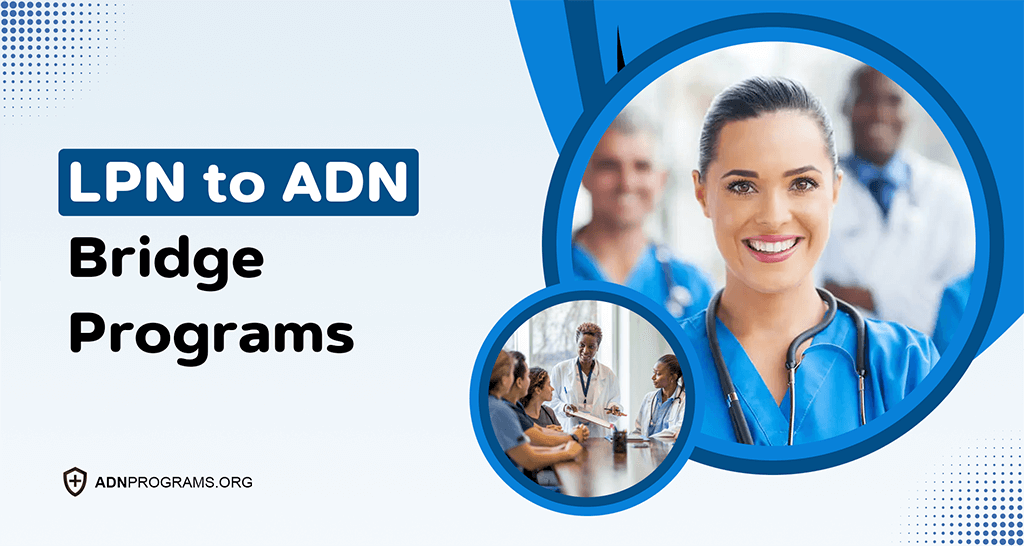
After working as Licensed Practical Nurses (LPNs) for a while, many health care professionals decide to advance into roles as Registered Nurses (RNs). While many opt to earn their Bachelor of Science in Nursing (BSN), earning an Associate Degree in Nursing (ADN) is faster and easier.
Although an LPN-to-ADN bridge program is faster, it's not necessarily easier. However, if your top priority is to earn your RN license as quickly as possible, the right bridge program can make a huge difference.
What Are LPN-to-ADN Bridge Programs?
As the name implies, an LPN-to-ADN bridge program is a degree program that is designed to "bridge the gap" in knowledge between what an LPN is expected to know and what an RN is expected to know. Unlike those who have no prior experience and who must complete standard ADN programs, those who are “licensed” LPNs can often earn their degrees more quickly by receiving credit for previous coursework and, in some cases, work experience too.
General Admission Requirements for LPN-to-ADN Programs
To be accepted into any LPN-to-ADN bridge program, you must be an LPN. In addition, you will need to meet the following requirements:
- LPN license
- High school diploma or GED
- Minimum of six months of LPN work experience
- Criminal background check
- Health screening
- Entrance exam
What to Look for in an LPN-to-ADN Bridge Program
When choosing an LPN-to-ADN bridge program, there are a few things to keep in mind:
- Accreditation: Make sure the program is accredited by a reputable organization, such as the Commission on Collegiate Nursing Education (CCNE) or the Accreditation Commission for Education in Nursing (ACEN).
- Flexibility: Look for a program that is flexible enough to fit your schedule and needs. Many programs offer online or hybrid options that can be completed while you continue to work as an LPN.
- Cost: Consider the cost of the program, as well as the financial aid that is available.
- Reputation: Read reviews of the program and talk to current and former students to get a sense of the program's quality.
LPN-to-ADN Program Prerequisites
Some LPN-to-ADN programs have prerequisites that must be completed before enrollment. These prerequisites typically include:
- English composition: This course will help you develop your writing skills, which are essential for success in nursing school.
- Math: This course will cover basic math concepts, such as algebra and statistics, which are used in nursing.
- Science: This course will cover basic science concepts, such as biology and chemistry, which are essential for understanding the human body and how it functions.
- Psychology: This course will help you understand human behavior, which is important for providing care to patients.
- Sociology: This course will help you understand the social context of health care, which is important for understanding the needs of patients and their families.
- Statistics: This course will help you understand how to collect and analyze data, which is important for research and evidence-based practice in nursing.
Typical Courses to Complete During LPN-to-ADN Training
The specific courses that you will take in an LPN-to-ADN bridge program will vary depending on the program. However, some of the most common courses include:
- Health assessment
- Adult health nursing
- Pharmacology
- Nursing research
- Community-based nursing
- Transition to professional nursing
- Women's health
Clinical & Lab Components in an LPN-to-ADN Program
All LPN-to-ADN programs require students to complete clinical rotations. These rotations give you the opportunity to apply the skills you have learned in the classroom to a real-world setting.
Most programs require students to complete their clinical rotations at a local healthcare facility. However, some programs may offer the option to complete clinical rotations online or at a distance.
Key Takeaways
An LPN-to-ADN bridge program is a great way to earn your RN license quickly and efficiently. By choosing the right program and meeting the admission requirements, you can be on your way to a successful career as an RN in no time.



